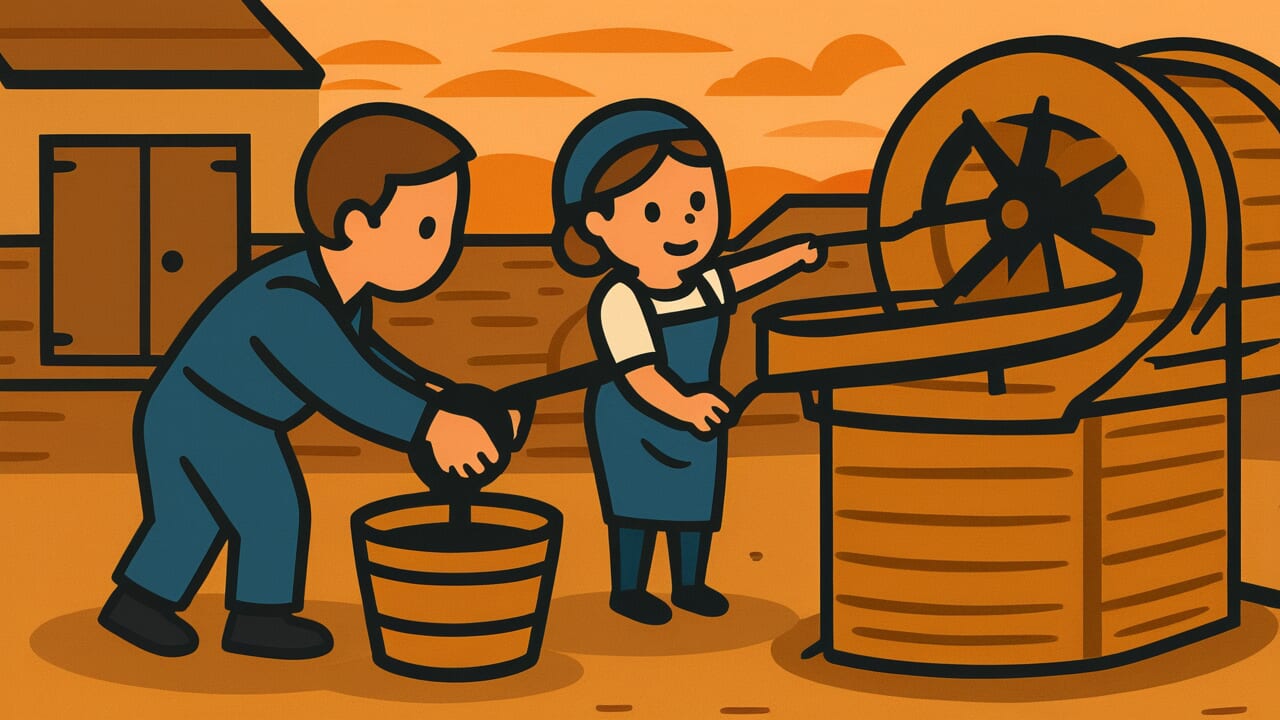How to Read “He who comes first grinds first”
He who comes first grinds first
[HEE hoo KUHMS FURST GRYNDZ FURST]
The word “grinds” here means using a mill to crush grain into flour.
Meaning of “He who comes first grinds first”
Simply put, this proverb means that the first person to arrive gets served before everyone else.
The saying comes from old grain mills where farmers brought wheat and corn. The miller would grind grain in the order people arrived. If you came early, your grain got processed first. If you came late, you waited while others went ahead of you. This created a fair system based on arrival time.
Today we use this wisdom in many situations. When a popular restaurant opens, the first customers get tables while others wait outside. During sales at stores, early shoppers find the best deals before items sell out. Job interviews often work the same way – companies sometimes hire the first qualified person they meet.
This proverb teaches us about timing and preparation. It shows that being ready and acting quickly often matters more than being the smartest or strongest. The person who shows up gets opportunities that others miss completely. It reminds us that good things don’t always wait for us to be ready.
Origin and Etymology
The exact origin of this proverb is unknown, but it likely comes from medieval farming communities. Grain mills were essential parts of village life for hundreds of years. Farmers depended on millers to turn their crops into flour for bread and other foods.
Mills operated on simple first-come, first-served rules because this seemed fairest to everyone. No one could claim special treatment or skip ahead in line. The miller didn’t have to make difficult decisions about who deserved priority. This system prevented arguments and kept the community peaceful during busy harvest seasons.
The saying spread as people recognized this principle worked in many situations beyond mills. Merchants, craftsmen, and other service providers adopted similar practices. Over time, the phrase became a general rule about fairness and timing. It eventually entered common speech as advice about seizing opportunities quickly.
Interesting Facts
The word “grind” comes from Old English “grindan,” meaning to crush or reduce to powder. This same root appears in related Germanic languages, showing how widespread grain processing was in ancient Europe. Mills were so important that many English surnames like Miller, Millwright, and Mills come from this profession.
Usage Examples
- Manager to employee: “The promotion will go to whoever submits their application first – he who comes first grinds first.”
- Parent to child: “If you want the best seat for movie night, get to the living room early – he who comes first grinds first.”
Universal Wisdom
This proverb reveals a fundamental truth about how humans organize themselves when resources are limited. Throughout history, people have struggled with the question of who gets what when there isn’t enough for everyone. The first-come, first-served principle emerged as one of the most widely accepted solutions to this eternal problem.
The wisdom works because it feels inherently fair to most people. Unlike systems based on wealth, status, or personal connections, arrival order treats everyone equally at the starting line. Anyone can choose to wake up early, plan ahead, or prioritize something important to them. This creates a merit system based on effort and commitment rather than advantages people are born with.
Yet this proverb also exposes a tension in human nature between individual ambition and collective harmony. While the system seems fair, it rewards those who can afford to wait in line or have flexible schedules. It favors people who hear about opportunities first through their social networks. The “fairness” only works if everyone truly starts with equal information and ability to participate. This explains why the principle feels both obviously right and subtly troubling – it reflects our desire for fairness while highlighting the reality that true equality remains elusive.
When AI Hears This
People who arrive first often invest more effort than the reward requires. They wake up early, travel farther, and wait longer than necessary. This reveals something strange about human thinking. We consistently overestimate the value of being first, even when logic suggests otherwise.
This behavior stems from our deep fear of missing out completely. Humans would rather waste time being early than risk losing everything. We calculate that some wasted effort feels better than total failure. This explains why people camp outside stores for sales or arrive hours early for appointments.
What fascinates me is how this “irrational” behavior actually works brilliantly. Those who consistently come first build reputations for reliability and commitment. They create opportunities that wouldn’t exist otherwise. Their willingness to overpay in time and effort becomes their greatest advantage in life.
Lessons for Today
Understanding this wisdom helps us navigate a world where timing often determines outcomes. The insight isn’t just about arriving early – it’s about recognizing when first-mover advantage matters and when it doesn’t. Some opportunities truly do disappear if we hesitate, while others reward patience and careful consideration.
In relationships and collaboration, this principle teaches us to respect systems that others depend on. When someone establishes a fair process, jumping ahead creates resentment and breaks trust. At the same time, we can advocate for ourselves by showing up prepared and engaged. Being present and ready often matters more than being perfect.
The deeper lesson involves balancing urgency with wisdom. Not every situation requires rushing to be first. Sometimes the early bird gets the worm, but sometimes the second mouse gets the cheese. Learning to distinguish between these moments – when to act quickly and when to wait strategically – transforms this simple rule into genuine life skill. The proverb reminds us that showing up consistently, with intention and readiness, creates more opportunities than talent alone ever could.



Comments